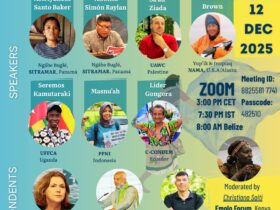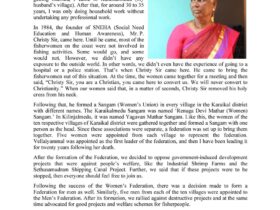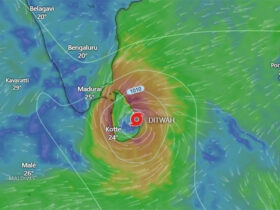WFFP has a democratic structure and seeks to make all decisions through consensus. WFFP allows for organisations to become members if they represent fisher peoples as defined in the constitution (read more); are democratically constituted and adhere to the WFFP constitution and comply with its objectives. The ethical guidelines of the WFFP are enshrined in the constitution.
In accordance with the constitution, all WFFP members represent fisher people; they work with and are directly accountable to their constituencies. This ensures a high level of local ownership and enables the organisations to develop a deeper understanding of the key issues affecting people at the grass roots level. Furthermore it strengthens WFFP and its members’ negotiating powers as legitimate stakeholders in decision-making processes from national to international levels.
The General Assembly constitutes the highest authority of WFFP.The General Assembly is composed of all of the delegates representing member organizations who attend that meeting. The General Assembly is held every four years. The functions of the General Assembly include: the adoption of resolutions; deciding on a Plan of Action to implement decisions; assigning tasks and duties to the Coordinating Committee; and the election of members to the new Coordinating Committee.
Each WFFP member organisation is entitled to representation at the General Assembly by two delegates, of whom at least one should be female.
The Coordinating Committee is composed of two Coordinators, (one female, one male) the General Secretary, the Treasurer and two representatives (one female, one male) from each of the five continents. The Coordinating Committee therefore has 14 members in total.
The Coordinating Committee is elected by and acts under the authority of the General Assembly and represents the WFFP. Hence, the Coordinating Committee is the highest authority in the day to day management of the organisation. The committee members serve for a period until the forthcoming General Assembly, which is normally three years. It is the responsibility of the current Coordinating Committee to ensure the implementation of the Plan of Action adopted by the previous General Assembly. It is furthermore its responsibility to:
a) facilitate the creation of Continental Fora
b) ensure implementation of the next the General Assembly
c) to develop a long term plan (strategic plan) for approval by the next General Assembly
d) propose recommendations to be put to the General Assembly
e) represent the World Forum of Fisher Peoples (WFFP) in decision making processes
As such, the Coordinating Committee is involved in some political day-to-day operations when these operations pertain to important decision making processes. This is, for example, the case in relation to UN level decision making processes. In other day-to-day operations – such as planning and implementation of learning and capacity building workshops and development and dissemination of information materials – the committee delegates the operations to the Coordinating Secretariat.
The Coordinating Secretariat is situated in the member organisation of an office bearer (a member of the Coordinating Committee) and in the country where the next General Assembly will be held. The Coordinating Secretariat is appointed by the Coordinating Committee on the basis of consensus agreement.



